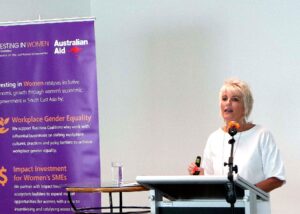“We have by no means got all the answers. But I think we’re doing a couple of things right that are seeing progress. Workplace gender equality (WGE) is a global issue, so we need to share what we’re doing so that we can all learn from one another,” said Workplace Gender Equality Agency (WGEA) Director Libby Lyons at the Achieving Progress on WGE: Data as a Driver of Change event in Manila in February.
“Across the world, tackling gender equality more broadly—and the pay gap, specifically—has become recognised as a gr owing policy priority by numerous governments,” Ms Lyons added. “From Sydney to Santiago, governments and organisations are grappling with choosing the right policies and practices to improve gender equality, and different countries take different approaches.”
Investing in Women (IW) and the Philippine Business Coalition for Women Empowerment (PBCWE) hosted the event, where Ms Lyons met with business and government representatives, as well as IW Business Coalitions in Indonesia and the Philippines, to discuss the importance of collecting and reporting data in advancing workplace gender equality.
In Australia, businesses with 100 or more employees are required by law to report to the WGEA against six WGE indicators, namely gender composition of the workforce and governing body; equal remuneration between women and men; availability of flexible work and family/caregiving policies; employee consultations; and sexual discrimination and harassment. Ms Lyons shared the highlights of WGEA’s efforts in data gathering and analysis, as well as key points that could be used as guidelines to help improve gender equality in Australia’s private sector.
“Part of the benefit of Australia being an early adopter of gender reporting is that we now have a very comprehensive data set and picture of the state of workplace gender equality. As far as we know, we are the only country in the world collecting the depth and breadth of data around gender equality,” said Ms Lyons.
Citing the pay transparency measures in Iceland and the UK as examples of such approaches, Ms Lyons shared further insights from Australia’s gender reporting scheme, stressing the importance of data in driving change. She also expounded on and clarified misconceptions on gender pay gap and flexible work.
“Our world-leading dataset underpins the push for gender equality in our workplaces—both in Australia and across the world. There is a very strong business case for change,” said Ms Lyons.
“The business case is so compelling that not only is this the right thing to do. If you’re a leader in the business community, it is the smart thing to do as well because it recognises that harnessing the skills of women is a productivity and economic imperative,” she added.

Aside from collecting the data Ms. Lyons mentioned, WGEA is responsible for actively promoting and advancing gender equality in Australian workplaces. It also provides education, advice and support to private sector companies.
At the PBCWE forum in Manila, Florian De Leon, First Vice President and Head of Human Resource of Insular Life; Coco Alcuaz, Executive Director of the Makati Business Club; and Marixi Carlos, Managing Director of the Accenture Intelligent Operations in the Philippines and Inclusion and Diversity (I&D) Executive Sponsor of Accenture Inc. joined Ms Lyons for a panel discussion led by IW CEO Julia Newton-Howes.
At a similar forum in Jakarta, the Indonesian Business Coalition for Women Empowerment (IBCWE) invited representatives from IBCWE member companies, relevant government agencies and regulators such as Otoritas Jasa Keuangan (Financial Services Authority of Indonesia) and the Indonesian Stock Exchange (IDX) to discuss mandatory corporate reporting on sustainability. Given the growing role of sustainability reporting in ASEAN and the importance of gender equality to a company’s sustainability, IBCWE is working with these organisations to help identify the best criteria for measuring WGE in Indonesian workplaces.
In both the Manila and Jakarta forums, IW, PBCWE and IBCWE presented the Gender Equality Results, Assessment, and Strategies (GEARS) tool. Adapted from WGEA’s own data reporting and assessment tools, GEARS has been designed to assist companies collect and analyse WGE data and use the data to drive change in their organisations.
View WGEA’s latest Gender Equality Scorecard

